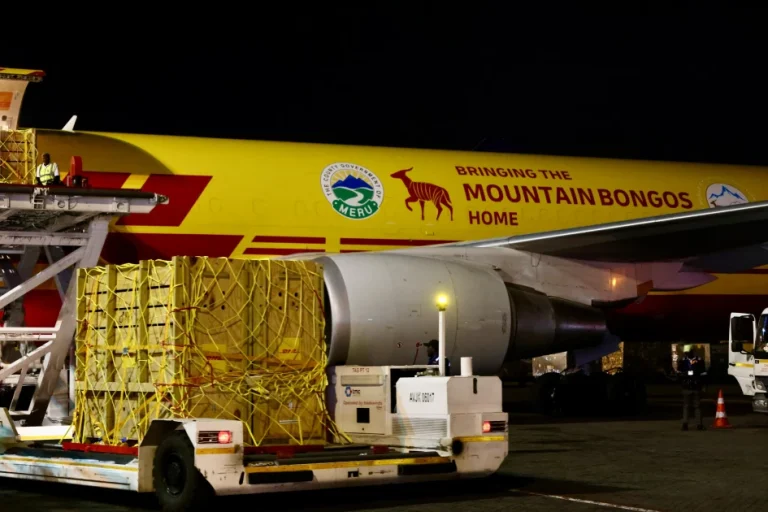Seventeen mountain bongos were successfully repatriated from Palm Beach County, Florida, to a specially designed sanctuary on the northeastern slopes of Mt. Kenya, marking a significant milestone in Kenya’s efforts to recover the critically endangered species.
The bongos were donated to the Government of Kenya by the Rare Species Conservatory Foundation (RSCF) in Florida, following decades of research and breeding. The translocation was made possible through collaboration between RSCF, Lewa Wildlife Conservancy, Tusk, DHL, and the Kenya Wildlife Service (KWS).
RSCF selected 17 bongos—12 females and five males—from its breeding herds. They underwent pre-shipment testing and vaccination, including a recombinant-DNA vaccine developed by the Infectious Diseases Laboratory (IDL) at the University of Georgia and Kenya’s International Livestock Research Institute (ILRI) to protect against tick-borne diseases.

On February 22nd, the animals were crated and given a sedative for their 30-hour journey. A DHL Boeing 767 transported them 7,146 nautical miles to Jomo Kenyatta International Airport. Accompanied by three U.S. animal-care experts, the bongos travelled in custom-built crates with six tons of feed. Upon arrival, the Kenya Wildlife Service transported them 250 kilometres by road to the sanctuary.
Lewa Wildlife Conservancy, in partnership with the Meru Bongo and Rhino Conservation Trust (MBRCT) and the Kenya Forest Service, played a key role in constructing the 20-acre sanctuary. This initiative is part of Kenya’s National Bongo Action and Recovery Plan, aimed at re-establishing sustainable populations across the Mount Kenya ecosystem.
Lewa CEO Mike Watson described the repatriation as “a great moment in restoring Kenya’s natural heritage,” while Lewa Board Member Prof. Amb. Judi Wakhungu emphasized the conservation significance, noting that the bongos’ ancestors left Kenya in the 1970s. Their return underscores the success of international conservation partnerships.
Beyond conservation, the project benefits local communities by creating jobs and investing in education, healthcare, and livelihoods. Lewa remains committed to safeguarding Kenya’s biodiversity through strategic partnerships and conservation efforts.
Key Facts:
- Fewer than 100 mountain bongos remain in the wild.
- The mountain bongo is the world’s largest and most endangered forest antelope, endemic to Kenya.
- This repatriation marks about 20 generations since the species’ export in the 1970s.
- RSCF has bred bongos for species recovery since 1991 and previously partnered with the UN for the first repatriation in 2004.
- Project partners include Kenya Wildlife Service, Kenya Forest Service, Meru County Government, Lewa Wildlife Conservancy, Kamulu and Ntimaka Community Forest Associations, RSCF, Tusk, and DHL.
By Moses Ngugi


